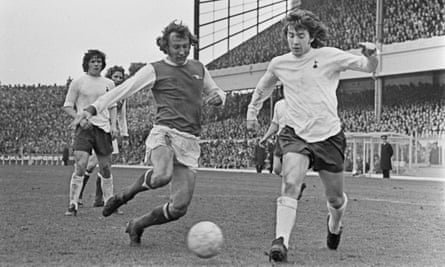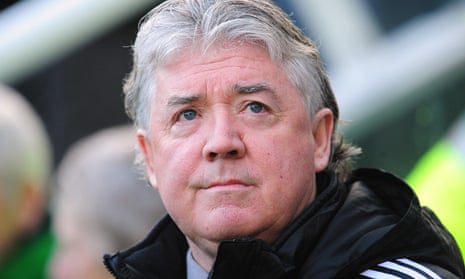Joe Kinnear, who has died aged 77, had a lively and successful career in three footballing arenas – as a trophy-winning defender with Tottenham during the 1960s and 70s, as a 26-cap international with Ireland, and as a combative, resourceful manager of Wimbledon in the 90s, when they defied the established order by maintaining their status as members of the Premier League throughout his seven-year reign.
A fleet-footed right-back, Kinnear won the FA Cup, League Cup (twice) and Uefa Cup with Spurs, while for Ireland he was a regular pick across three European championship and two World Cup qualifying campaigns from 1967 to 1975. But of the three elements of an eventful sporting life, his time with Wimbledon was probably the most impressive, given that he was leading a team that barely had any right to be mixing it in the top division.
Despite being heavily tipped for relegation in each year of Kinnear’s tenure from 1992 onwards, Wimbledon managed highly respectable finishes of 12th, 6th, 9th, 14th, 8th and 15th in the six full seasons he led them in the Premier League, with a high water mark in the 1996-97 season, when they made it to the FA and League Cup semi-finals and at one point looked to be in genuine contention for the league title. After Kinnear was forced to step down through ill health in 1999, Wimbledon were relegated soon after his departure.
Born in Dublin, he was the son of Margaret (nee O’Reilly) and Joe Reddy, a Guinness brewery worker. The marriage broke down when he was small, and his mother moved to England, setting up home with a new partner, Gerry Kinnear, in Watford, Hertfordshire. Joe joined his mother when he was six and grew up with his four sisters, taking his stepfather’s surname.
His footballing exploits at Leggatts Way secondary modern school soon led to the captaincy of the Watford and Hertfordshire schoolboys teams, and later, while working as a printing apprentice, he joined non-league St Albans City, where he was spotted by Tottenham’s scouts. Signed by the manager Bill Nicholson as an amateur in 1963, he turned professional two years later, making his debut in 1966.

Known for his pace and physicality, by 1967, at the age of 20, Kinnear had fully established himself in the Spurs side, making 28 appearances during the 1966-67 season, including a 2-1 win in the 1967 FA Cup final against Chelsea, in which he was widely held to have been man of the match. There was a setback when he missed the best part of a year after breaking his leg in January 1969, but he was able to recover his berth on his return and went on to claim winners’ medals in the 1971 League Cup, 1972 Uefa Cup and 1973 League Cup finals with victories over Aston Villa, Wolves and Norwich City respectively.
Not long after the last of those medal wins, however, Kinnear began to find his place under challenge from a new boy, Ray Evans, and after making only 24 appearances across the 1973-74 and 1974-75 seasons he decided on a move to Division Three Brighton in the summer of 1975, having played in 258 matches for Spurs in all competitions. He lasted just one season at Brighton before retiring with a knee injury at 30, also making his final appearance for Ireland during that campaign, in October 1975 against Turkey.
Beginning his managerial career with coaching jobs in the UAE, Malaysia, India and Nepal, he eventually returned to the UK as assistant manager to his old Spurs club-mate Dave Mackay at Fourth Division Doncaster Rovers in the late 80s. He became caretaker manager there in 1989 when McKay moved to Birmingham City, before moving to Wimbledon as their reserve team manager in the same year.
By that time the previously lowly south-west London club, to the amazement of many observers, had settled themselves into the top flight of English football and had even won the FA Cup in 1988, having been a non-league outfit 11 years prior to that triumph. When Kinnear took over the full managerial role in 1992 he did so in the wake of a predecessor, Peter Withe, who had made an ill-judged attempt at ditching the club’s anarchic “Crazy Gang” culture before being sacked after 105 days in charge.
In contrast Kinnear fully understood what made Wimbledon tick, and was almost immediately able to restore the club’s fortunes by reinstating its sense of underdog spirit and a commitment to direct football.
Gruff, tough and hard-headed, though with a witty, larky side, Kinnear was a manager in the Wimbledon players’ image. He was also an excellent man-manager, had a fine nose for signing players such as Kenny Cunningham, Dean Holdsworth and Marcus Gayle who could make the step up from lower divisions to the Premier League, and was adept at bringing through homegrown talent, including Jason Euell, Neal Ardley and Chris Perry. He was voted the League Managers Association manager of the year in 1994 and won four Premier League manager of the month awards – as many as have ever been claimed by José Mourinho, Mauricio Pochettino or Roy Hodgson.
Kinnear’s time at Wimbledon effectively ended when he had a heart attack before a match at Sheffield Wednesday in March 1999 at the age of 52. In June of that year he resigned to make way for Egil Olsen as his successor, and relegation arrived the following season.
Within two years he had re-emerged at Luton Town, where he made himself manager after initially having been appointed director of football. He took his side up from Division Three to Division Two in 2003 and kept them there before being sacked by a new set of owners the following year. He then became manager of second tier Nottingham Forest, but resigned within 12 months after a series of poor results.
Subsequently out of the game for almost four years, in 2008 Kinnear was recruited by Premier League Newcastle United as their caretaker manager in a surprise move following the unexpected resignation of Kevin Keegan. After a good start he was given the permanent role but within three months – in which he often had a testy and expletive-ridden relationship with the media – he had to step down to undergo a heart bypass operation.
In a coda to that short spell, five years later Newcastle appointed him as their director of football on a three-year contract, a position in which he lasted just six months before resigning again. His brief time in the role was marked by some odd pronouncements and erratic behaviour, and within a year he was diagnosed with dementia.
He is survived by his wife, Bonnie (nee Arnold), and their daughter, Russelle; their son, Elliot, predeceased him.

Comments (…)
Sign in or create your Guardian account to join the discussion